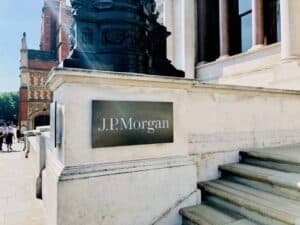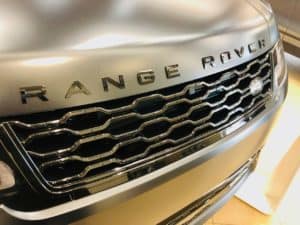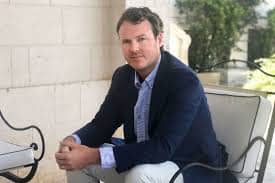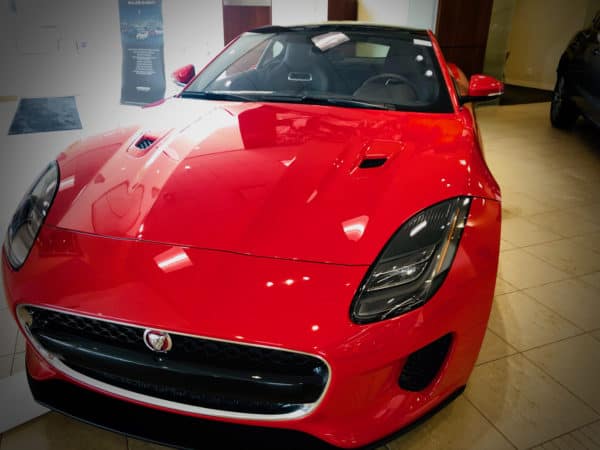While Facebook has stolen the show with news of Libra and its cadre of notable brand partners, the community also values the many other household brands that have pioneered with blockchain. Just a few short years ago, distributed-ledger technology was the domain of a small group of privacy-driven engineers and hobbyists, carrying little mainstream appeal. Today, a number of the most renowned global brands across a variety of sectors are integrating blockchain technology in an effort to upgrade their business models.
These 5 brands are making significant strides towards a more decentralized future:
JPMorgan Chase
 America’s largest bank, managing $2.74 trillion in assets, has the longest running fascination with blockchain in the traditional financial sector. Despite famously dismissing Bitcoin as “a fraud” in September 2017, a move he later regretted, JPMorgan CEO Jamie Dimon always maintained his belief in the distributed-ledger technology underpinning the cryptocurrency.
America’s largest bank, managing $2.74 trillion in assets, has the longest running fascination with blockchain in the traditional financial sector. Despite famously dismissing Bitcoin as “a fraud” in September 2017, a move he later regretted, JPMorgan CEO Jamie Dimon always maintained his belief in the distributed-ledger technology underpinning the cryptocurrency.
Indeed, JPMorgan began exploring the technology as early as 2016, when the bank published a whitepaper for Quorum, its private blockchain, based on the Ethereum network. A year later, Quorum would come to power the Interbank Information Network (IIN), a peer-to-peer network that reduces interbank friction in areas such as cross-border payments and trade settlement. The Network counts 237 banks across every major market amongst its members, as of June 2019. Furthermore, the bank is moving to test its fiat-backed digital asset, nicknamed “JPMorgan Coin,” that will be used to slash settlement times for clients of its wholesale payments business.
Jaguar
As the auto industry races towards a self-driving, electric future, the efficiencies of recording and sharing vehicle data on the blockchain will enable manufacturers, insurers, city planners and drivers to exchange information freely on an open platform. Jaguar Land Rover, through its venture arm, InMotion Ventures, joined with a U.K. government-backed firm to fund a seed round for Dovu, a startup building a global marketplace for transport data.
 Dovu aims to open up the availability of a range of transport data sets, from geo-location data for each car on the network to the flow of electricity from charging stations for public and enterprise use. Earlier this year, Jaguar announced a partnership with IOTA to reward its drivers with digital assets in exchange for their data. Cars will be installed with the sensors which will beam data, messages or small files to the IOTA distributed ledger. Jaguar drivers will receive IOTA’s native digital asset, in return for granting data access to city authorities, navigation providers and other relevant parties. Blockchain technology, along with smart devices and image recognition technology, is essential to the autonomous future of mobility.
Dovu aims to open up the availability of a range of transport data sets, from geo-location data for each car on the network to the flow of electricity from charging stations for public and enterprise use. Earlier this year, Jaguar announced a partnership with IOTA to reward its drivers with digital assets in exchange for their data. Cars will be installed with the sensors which will beam data, messages or small files to the IOTA distributed ledger. Jaguar drivers will receive IOTA’s native digital asset, in return for granting data access to city authorities, navigation providers and other relevant parties. Blockchain technology, along with smart devices and image recognition technology, is essential to the autonomous future of mobility.
Microsoft
As with any disruptive innovation, it is incumbent upon traditional software companies to adapt to the new world of open platforms created by blockchain technology. Microsoft, which recently made headlines by becoming the first major tech company to build directly on the Bitcoin blockchain, has shown that it grasps the potential of distributed networks.
Known as ION, this latest open-source project handles the way networks talk to each other. The process of logging in to external online services, such as Spotify and Canva, with a Facebook account is one with which many consumers are familiar. ION enables the communication between Facebook and external services providers to take place on the blockchain, giving users greater control of their identification data.
Having created the first widely used operating system for the PC generation, Microsoft is shifting its focus to building decentralized protocols that rely on public networks, like Bitcoin or Ethereum, yet can handle far greater throughput than the underlying blockchain.
The Seattle-based software giant is also incorporating blockchain technology into its existing service offerings, such as the Azure cloud. In a move that signifies the unique synergies that are emerging in the space, JPMorgan and Microsoft recently struck up a strategic partnership that will see Quorum become the first platform available through the Azure Blockchain Service, which is fully managed and designed to remove the complexity of developing and maintaining blockchain networks.
Nike
Sports giant Nike, known for its slew of celebrity athlete endorsements and daring marketing campaigns, is harnessing blockchain technology to power its digital strategy. As many significant  corporate moves began, so did Nike’s, with a filed patent. “Cryptokicks,” a word now trademarked to Nike, will enable users to “mine, earn, purchase, receive by any other means, store, and transfer blockchain-based tokens.”
corporate moves began, so did Nike’s, with a filed patent. “Cryptokicks,” a word now trademarked to Nike, will enable users to “mine, earn, purchase, receive by any other means, store, and transfer blockchain-based tokens.”
In addition to growing sales on its mobile-friendly platform, blockchains can document consumer preferences and cultural trends, enabling Nike to tailor product lines to the needs of customers. As brick-and-mortar stores continue to cede ground to e-commerce, expect other consumer brands to join Nike in crafting a custom experience for their customers with the help of blockchain technology.
Anheuser-Busch InBev
Beer and blockchain make for an intriguing pair at Anheuser-Busch InBev, the holding company behind legacy beer brands such as Stella Artois, Corona and Budweiser; it could be the combination that improves the lives of African farmers. These farmers, who procure the raw materials that eventually get made into beer, often lack the qualifications to open bank accounts, making them reliant upon a string of middlemen to connect them with the brands they supply. BanQu, a blockchain startup working to connect members at the earliest stages of global supply chains directly with producers, has received an expanded Series A investment from the beverage giant. The BanQu’s technology aims to provide scores of unbanked and underbanked people with reliable economic identities in an effort to connect them to the financial system. As part of the partnership with Anheuser-Busch InBev, BanQu piloted a project to connect 2,000 Zambian cassava farmers to their mobile platform, enabling Zambian breweries to track their product from the farm to the pub.
As of now, blockchain technology is admittedly more of a promise than a proven solution; like any emerging technology. However, as trusted partners with proven engineering expertise test, innovate, shape and implement change for the sake of being more efficient, transparent, secure, traceable, or even just to be fair to individuals within a business ecosystem, these efforts are critical to propelling blockchain projects beyond the proof-of-concept stage. With more and more of your favorite brands exploring the opportunity of blockchain, it is only a matter of time before distributed-ledger technology powers a number of essential use-cases.
 Will McDonough is Chairman and CEO, Diginex Americas. Diginex develops and implements blockchain technologies to transform businesses and enrich society. At the core of Diginex is its people. With a blend of financial service professionals, passionate blockchain technologists, and experienced project managers, Diginex works with corporations, institutions & governments to create solutions that build trust and increase efficiency. McDonough is an investor and entrepreneur with a career that has ranged from sports management to global finance. McDonough has been working in blockchain since 2017 when he launched iCash, the first ever smart contract adjudication protocol for blockchain transactions. Prior to that, he led the IPO for Atlas Mara (ATMA:LSE), which he co-founded with former Barclays CEO, Bob Diamond. Prior to founding Atlas, Will and his team in the Investment Management Division of Goldman Sachs managed more than $17 billion in private capital of the firm’s current and retired partners. Before that, he partnered with New York-based Avenue Capital Group to co-found a $250 million distressed debt fund of funds. Since 2001, he has run his own highly successful management company called MMG, where he represented The Estate of Nelson Mandela, New England Patriots Quarterback and Super Bowl MVP Tom Brady, and supermodel/activist Gisele Bundchen. MMG also co-founded a children’s entertainment company with Andy Heyward, Warren Buffett, Martha Stewart, Stan Lee, and Arnold Schwarzenegger to build educational content for children.
Will McDonough is Chairman and CEO, Diginex Americas. Diginex develops and implements blockchain technologies to transform businesses and enrich society. At the core of Diginex is its people. With a blend of financial service professionals, passionate blockchain technologists, and experienced project managers, Diginex works with corporations, institutions & governments to create solutions that build trust and increase efficiency. McDonough is an investor and entrepreneur with a career that has ranged from sports management to global finance. McDonough has been working in blockchain since 2017 when he launched iCash, the first ever smart contract adjudication protocol for blockchain transactions. Prior to that, he led the IPO for Atlas Mara (ATMA:LSE), which he co-founded with former Barclays CEO, Bob Diamond. Prior to founding Atlas, Will and his team in the Investment Management Division of Goldman Sachs managed more than $17 billion in private capital of the firm’s current and retired partners. Before that, he partnered with New York-based Avenue Capital Group to co-found a $250 million distressed debt fund of funds. Since 2001, he has run his own highly successful management company called MMG, where he represented The Estate of Nelson Mandela, New England Patriots Quarterback and Super Bowl MVP Tom Brady, and supermodel/activist Gisele Bundchen. MMG also co-founded a children’s entertainment company with Andy Heyward, Warren Buffett, Martha Stewart, Stan Lee, and Arnold Schwarzenegger to build educational content for children.


